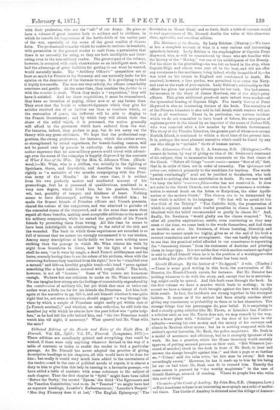Gerald Hastings. By the Author of " No Appeal." 3
vole. (Tinsley.) —There is some good writing in this book, the conversation of Mr. Minster, the Broad-Church curate, for instance. But Mr. Dunster has nothing whatever to do with the story, and, except that he is entertain- ing, might easily be spared. And this fault runs through the book. In the first volume we have a murder which leads to nothing ; in the second we have a charge of theft brought against the hero with equally little result. In fact, the incidents are strung together in the strangest fashion. It seems as if the author had been utterly careless about giving any consistency or probability to them or to her characters. The strange things that her personages do, pass belief. It is surprising to find a steady-going solicitor like Mr. Thorn, of Lincoln's Inn Fields—
a solicitor such as was Mr. Thorn does not, we may remark by the way, have a brass plate with "Solicitor" on the door of his house in the
suburbs—wasting his own money and the money of his servants and clients in Mexican silver mines ; but he is nothing compared with the author's special favourite, Mr. Beak, the police magistrate. Mr. Beak is a model of acuteness and efficiency, but he is strangely ignorant of his work. He has a practice, which the Home Secretary would scarcely approve, of putting accused persons on their oath. "Bob Winnecot [ac- cused of murder] stood in the dock in front of Mr. Beak, to hear and answer the charge brought against him ;" and then a page or so further en, "'Usher,' said the calm voice, let this man be sworn.' Bob was accordingly sworn." However, he has it made up to him by his being let out on bail when Mr. Beak sees fit to remand him. Exactly the same course is pursued by "the worthy magistrate" in the case of Gerald Hastings, accused of stealing. Where do people live who write this sort of thing ?






























 Previous page
Previous page